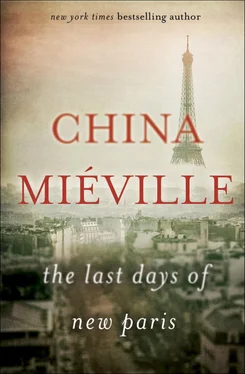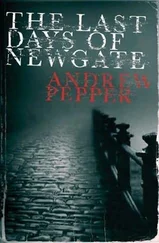“What’s this?” he said.
She flipped through engravings to a picture of a trumpeting thing, a spiked tail, a horde of little devils. He recognized them. They beset the same St. Anthony that they had seen a few streets away.
“It’s by Schongauer,” she said.
“Where did you get this?”
“A library.”
Thibaut shook his head at her foolishness or bravery. To plunder a library! Books were not safe.
“Thing is,” she said. “That manif? Of this image? I don’t think it just self-generated. It’s not close enough. To the heart of the S-Blast.”
In the fecund shock waves of the explosion, it was not only the Surrealists’ own dreams that had manifested. Born with them were figures from Symbolism and Decadence, imaginings of the Surrealists’ ancestors and beloveds, ghosts from their proto-canon. Now Redon’s leering ten-legged spider hunted at one end of rue Jean Lantier, chattering its big teeth. A figure with Arcimboldo’s coagulate fruit face stalked the boundaries of the Saint-Ouen market.
“If this was Dürer, maybe,” she said, “or Piranesi. Schongauer? He’s important, but I don’t think he’s core enough to manifest spontaneously. I think someone invoked this deliberately.”
“Who?” Thibaut said. “Why?”
“The Nazis. Maybe they want devils that’ll follow orders better. I think they want their own manifs,” Virginie said. “I think they’re still trying.” They regarded each other. Pictured their enemies tugging at images from pages with whatever invocatory engines they could put together. “The Führer himself,” Virginie said heavily, “is an artist, after all.” Reproductions of his barely competent watercolors, his hesitant lines, his featureless faces, his vacuous, pretty, empty urban façades, had circulated as curios in occult Paris. Virginie and Thibaut shared a glance of contempt.
Whatever their source, those devil-manifs were weak, without even the verve to fully emerge. They’re probably there still, thinks Thibaut. Endlessly eating endless, dumb, saintly prey.
He approaches Garibaldi and boulevard Pasteur. Behind shutters he makes out the guttering of candles. These houses are tiny communes. A family in each room, stoves burning broken chairs, routes holed between walls. House-villages. Thibaut falls asleep and dreams as he trudges Haussmann’s boulevards.
He dreams Élise falling toward him in blood that obscures her face. He sees Virginie, and Paul, and Jean, and the rest of them, and he is too late to do anything but cradle their dying heads in the dark of the forest.
Thibaut does not cry out but he does jolt himself awake, still walking. He sets his face back into a city sneer.
—
At a junction, shining in the moon’s white light, there is motion, and Thibaut slows. Two skeletons. They jerk their fleshless limbs. They walk a slow circle.
Thibaut is still. The dead feet click.
Alain, the best officer his cell ever voted into place, would treat such prim Delvaux bones, or the dens of fossils, prone Mallo skeletons shaking themselves repeatedly apart, with great respect. It had not stopped three of them jabbing him to death one humming hot June day with their own splintering matter.
Thibaut backs away. He does not want to fight manifs.
The organ in him, his new muscle, cramps at a sudden spasm of manif energy. It comes from somewhere else. He staggers. It comes again, so hard he doubles up.
There is a rapid cracking of shots. The skeletons do not pause. The sounds are to the north. They are away from Thibaut’s route, but close, and his own insides still grip him from within, tug him, and when he runs, it is, almost to his own bewilderment, toward the firing.
Through a boundary into the seventh. His ears pop. Another shot. Thibaut smells sap.
The avenue de Breteuil is full of aspen trees. Their boughs stretch out to touch the houses. The complex of Les Invalides, that sprawling and once-opulent old military zone, is out of sight, has been overcome by millennial vegetation. Lampposts struggle up from roots and roofs from the canopy. The Cathedral of Saint-Louis des Invalides is filled with bark. The Musée de l’Armée is being emptied, with slow, vegetable disorder, its weapons gripped and tugged over weeks out of their cases by curious undergrowth.
Another shot: a flock of night things disperses. Something laughs. A woman runs out of the forest. She wears thick glasses, tweed trousers, and jacket, all smeared with woodland muck. She labors under bags and equipment, waves a pistol.
There are growls, the snarl of breath. Beasts come rushing through the trees after her, with strange quick staggering.
They are little tables, stiff board bodies, unbending wooden legs, thrashing tails, and ferocious canine faces. They scream and bite the air. Fanged furniture jerking across the rough ground.
Thibaut hisses and steps past the stumbling woman into her pursuers’ path, between them and their quarry. They’ll veer from him, he thinks, as most manifs do.
But they attack. They keep coming.
He is almost too slow, in his shock, to bring up his gun. He fires as the first animal thing leaps, sends the growling table flying in an explosion of splinters.
Others hurl themselves at him, and his cotton nightclothes are suddenly as tough as metal. He swings his arms. The pajamas grip Thibaut, make him an instrument, propel him fast and hard. A wood-and-taxidermy predator reaches him, biting, and Thibaut’s clothed arm comes down and snaps its spine.
He stands between the woman and the wolf-tables, snarling as bestially as the pack. The tables inch forward. With a burst of creative chance Thibaut shoots the closest right in its snarl and sends it down in blood and sawdust.
There’s shouting from the forest. He can see two, three figures in the trees. SS uniforms. A man in a dark coat, calling in German. Quick! Be careful! The dogs—
A burly officer fires right at him out of the shadows. Thibaut howls. But the shots ricochet from his chest. The soldier frowns as Thibaut brings his own rickety old rifle up and shoots and misses of course and reloads while the man still watches, stupid and slow, and Thibaut fires again, this time with disponibilité, and puts him down.
Wolf-tables bite. A Nazi cracks a whip, to rally them, to gather them, and Thibaut snatches as the leather swings. It slaps and wraps his hand and makes it numb but he grips. By him the woman drops, pushes her fingers into the topsoil: the furniture that menaces her twitches and backs away. Thibaut yanks the whip-holder toward him by his weapon and punches him back again, sending him flying into the dark.
The Germans hesitate. The pack howls. Thibaut smacks a tree hard enough to make it quake, showing his pajama-ed strength. The attackers retreat, into the forest, back out of sight, toward the corridors of Les Invalides. The humans call as they run, and the little tables follow the sound, baring their teeth as the darkness takes them.
—
“Thank you,” the woman says. “Thank you.” She is gathering her fallen things. “Come on.” She speaks French with an American accent, a thin and cultured voice.
“What in hell was that?” Thibaut says. The man he just hit is dead. Thibaut goes through his pockets. “I’ve never seen anything like those things before.”
“They’re called wolf-tables,” the woman says. “Manifest from an imagining by a man called Brauner. We must go.”
Thibaut stares at her. Eventually he says, “Brauner’s have fox parts. Those tables were bigger than any I’ve seen, and their fur was more gray. They didn’t look like foxes. It’s as if they were crossbred. The soldiers called them ‘dogs.’ And they were doing what they were told. And…” He looks away from her. “As I say, I’ve never seen any manifs, including wolf-tables, like them before.” And they came right at me. They didn’t hesitate.
Читать дальше













